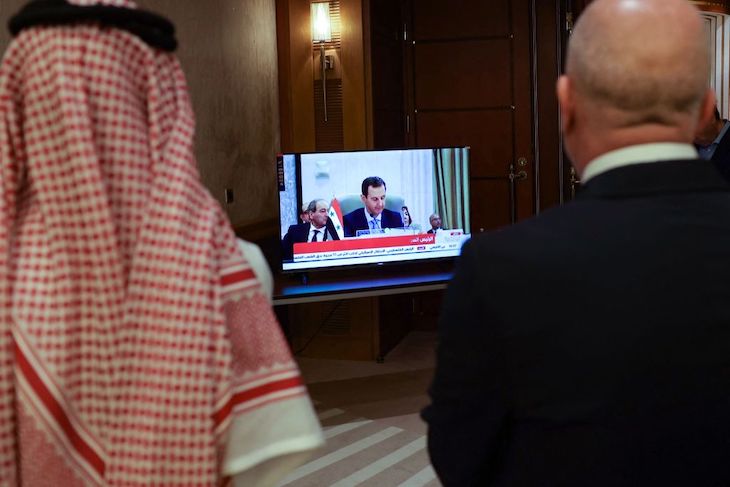In mid-May, Saudi Arabia welcomed Syrian regime leader Bashar al-Assad to the Kingdom ahead of an important meeting of the Arab League. Ukraine’s Volodymyr Zelensky was also welcomed and invited to the League meeting. The two leaders visiting the country at the same time symbolise Saudi Arabia’s increased role in regional and global diplomacy. Helping to bring Syria’s regime in from the cold can be seen as Riyadh’s willingness to confront western consensus on Syria, while hosting the Ukrainian leader looks like a way to show that the Middle East can play a role in a key conflict reshaping the world today.
Saudi Arabia has reinvented itself in the last few years. The country has been an important player in the Middle East and globally for many years, due to its economy and as a centre of Islamic influence, but it has faced challenges in the last decade. Riyadh intervened in Yemen in 2015 and increasingly found itself under threat from the Iranian-backed Houthis. It also led the UAE, Bahrain and Egypt to break relations with Qatar in 2017. Riyadh seemed to lurch from one controversy to the next over these years and it didn’t seem to achieve much of a return on its various policies, from tensions with Iran to increasing anger directed at Saudi in the West.
Now, as Joe Biden is fond to say of America being ‘back’, it appears Saudi Arabia is back. The Kingdom announced an unprecedented reconciliation with Iran in March. This deal rapidly led to normalisation of diplomatic ties and a number of steps that appear to be reducing conflict in Yemen and returning diplomats to each country. In April, the Syrian foreign minister came to Saudi Arabia, in the run-up to the Arab League meeting.
Diplomacy is also having practical results. When fighting broke out in Sudan between the army and a large paramilitary group in April, Riyadh helped arrange flights out for those stranded and also partnered with the US to arrange a ceasefire in late May. It remains to be seen if the Saudis can actually make this ceasefire work. However, the shift from the past is clear. Today Saudi Arabia wants to be a clear player in ending conflicts. The country also backed the Abraham Accords peace deals between Israel and the UAE and Bahrain and there are constant rumors about possible normalisation between Israel and Saudi Arabia. In November 2022, Saudi Arabia helped broker the release of several Britons who were being held by Russian-backed separatists.
There are key questions about where this new Saudi Arabia may be going. On the one hand the foreign policy choices of Riyadh are independent of the West. The outreach to Syria has resulted in many other countries also doing outreach, including key Saudi partners such as Jordan. In addition it remains to be seen whether Saudi Arabia can use the outreach to achieve its interests in Jordan, Iraq or other countries. Riyadh has historically opposed Iranian-backed groups such as Hezbollah in Lebanon or Kataib Hezbollah in Iraq. In addition it’s unclear what will happen in Yemen and whether Riyadh will really normalise ties with Israel.
US concerns about Saudi Arabia’s ties to Russia and China will continue to bedevil ties. This has been a constant concern for Washington in terms of its many traditional partners and allies. For instance the US has been concerned about China’s investment in a port in Israel, and also the way countries like Turkey, a member of Nato, have done outreach to Russia, including buying arms from Moscow. The West’s ties with Saudi Arabia matter on many issues, from trade to the wider Islamic world. As the West pivots to a more confrontational policy with Russia, in the wake of Moscow’s invasion of Ukraine, countries that appear to be open to Russia or China will be in the spotlight. The question regarding Riyadh’s policies therefore will revolve around whether this leads to positive outcomes or increased tensions with the West. So far it appears that the outcomes have been positive. The ceasefire in Sudan was important and Saudi Arabia has also helped broker prisoner exchanges in Ukraine. For now the initiatives appear to be turning the corner on decades of conflict in the Middle East and exchanging division for a new diplomatic era. Saudi Arabia is a key leader of that new era.






Comments